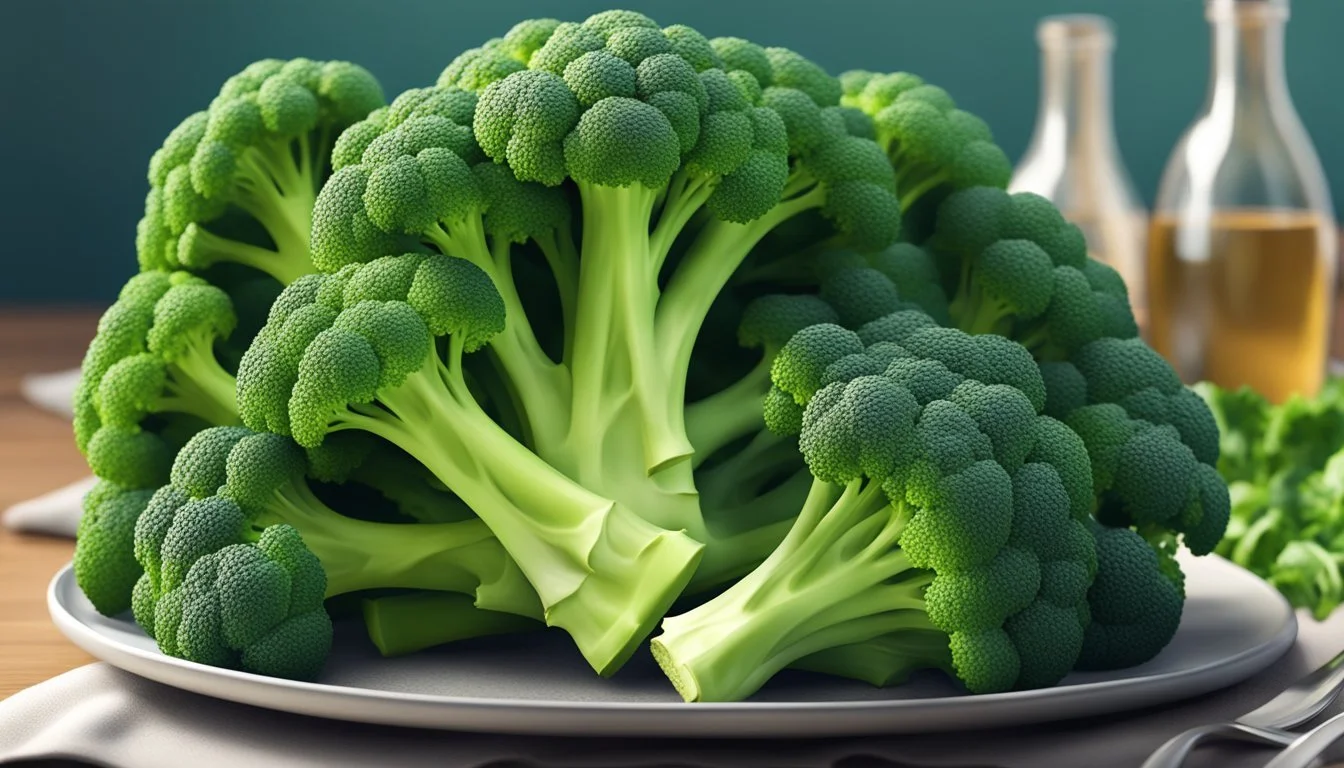Top 10 Alkaline Foods to Balance Your Diet
Top Choices for a Balanced Diet
The concept of an alkaline diet revolves around consuming foods that have a higher pH level, which theoretically helps to maintain the body’s natural pH balance. Advocates suggest that this type of diet can promote better health and prevent certain diseases by reducing acidity in the body, thus creating a more favorable environment for overall well-being.
Foods high in alkaline are predominantly fruits, vegetables, nuts, and legumes, which not only help balance pH levels but also provide essential nutrients. These foods are considered beneficial for muscle preservation, hormone regulation, and glucose level management, offering a natural and holistic approach to maintaining a healthy lifestyle.
1) Spinach
Spinach ranks high among alkaline foods due to its rich nutrient profile and significant health benefits.
This leafy green is packed with vitamins A, C, and K, as well as minerals like magnesium and iron. The high alkaline content helps maintain a balanced pH level in the body.
Spinach is also a versatile ingredient. It can be used in salads, smoothies, soups, and cooked dishes. Its mild flavor makes it easy to incorporate into various meals.
Research suggests that spinach may contribute to improved bone health, thanks to its vitamin K content. Additionally, the antioxidants present in spinach may support eye health and reduce oxidative stress.
In summary, spinach is a valuable addition to any diet aiming to increase alkaline food intake. It offers a wide range of nutritional benefits and is easy to include in everyday meals.
2) Kale
Kale stands out as one of the most alkaline vegetables available. Its high chlorophyll content is a key factor contributing to its alkalinity. Chlorophyll helps neutralize acids in the body, promoting a balanced pH level.
This dark leafy green is not only alkaline but also packed with nutrients such as vitamins A, C, and K. These vitamins support various bodily functions and contribute to overall well-being.
Kale also contains glucosinolate compounds, which have been linked to cancer prevention. These compounds help detoxify the body and support the immune system. Including kale in your diet can therefore offer multiple health benefits.
Additionally, kale's versatility makes it easy to incorporate into meals. It can be eaten raw in salads, blended into smoothies, or cooked in various dishes. Its availability year-round also makes it a practical choice for everyday consumption.
3) Swiss Chard
Swiss chard is a leafy green known for its high alkalinity and numerous health benefits. It ranks highly among alkaline vegetables, making it a favorable choice for those seeking to maintain a balanced pH in their diet.
Loaded with vital nutrients, Swiss chard is particularly rich in vitamins K, A, and C. Just a small serving can fulfill daily vitamin K requirements while also providing significant amounts of vitamin A and vitamin C.
Swiss chard also contains a substantial amount of antioxidants, including polyphenols. This contributes to its potential for reducing oxidative stress in the body and promoting overall health.
Additionally, Swiss chard is high in dietary nitrates, which are linked to improved vascular health. This can help support cardiovascular function, making it a versatile and beneficial addition to one's diet.
4) Cucumber
Cucumbers are a notable addition to an alkaline diet. Known for their high water content, they play a significant role in hydration.
Cucumbers help balance the body's pH levels. They are alkaline-forming, which assists in reducing acidity in the body.
Rich in nutrients, cucumbers contain vitamin K, antioxidants, and other essential vitamins. These components promote health without adding excess calories.
Incorporating cucumbers into meals can provide various health benefits. From salads to smoothies, they are versatile and easy to include in daily diets.
5) Celery
Celery is known for its high alkalinity, making it a standout in an alkaline-focused diet. Rich in essential nutrients, it helps neutralize acids in the body.
Celery contains high levels of potassium and sodium, acting as a natural diuretic. This assists in expelling excess fluids from the body.
Additionally, celery's high-water content aids in hydration, nourishing cells throughout the body.
Celery can be easily incorporated into salads, smoothies, or eaten as a snack. This versatility makes it a convenient addition to daily meals.
Celery is also notable for its low calorie count, providing significant nutritional benefits without adding extra calories.
6) Broccoli
Broccoli stands out as a high-alkaline vegetable, rich in essential nutrients and beneficial for overall health.
It contains a variety of vitamins, such as vitamin C and vitamin K, along with significant levels of fiber. These nutrients are instrumental in supporting the immune system and aiding digestion.
Beyond its nutritional content, broccoli serves as a versatile ingredient in the kitchen. It can be steamed, roasted, or stir-fried, retaining its alkaline properties through various cooking methods.
Broccoli's compounds, like sulforaphane, have been studied for their potential health benefits, including supporting cellular health.
Regular consumption of broccoli can thus be a valuable addition to an alkaline-focused diet. It pairs well with other vegetables and proteins, making it easy to incorporate into daily meals.
By including broccoli in one's diet, individuals can enjoy both its nutritional benefits and its role in maintaining a balanced pH level in the body.
7) Zucchini
Zucchini is a versatile vegetable that is high in alkaline content. It can be easily incorporated into various dishes, making it a favorite in alkaline diets.
Rich in vitamins and minerals, zucchini provides essential nutrients such as vitamin C, potassium, and magnesium. These elements contribute to maintaining the body's pH balance.
Due to its high water content, zucchini is hydrating and supports digestion. It is also low in calories, making it an excellent choice for those looking to manage their weight.
Zucchini can be eaten raw, cooked, or spiralized into noodles. Its mild flavor pairs well with many other vegetables, enhancing both taste and nutritional value in meals.
Including zucchini in daily meals can aid in reducing the body's acidity levels. Its ease of preparation and variety of use make it a convenient option for those following an alkaline diet.
8) Avocado
Avocado is well-known for its health benefits and is considered an alkaline-forming food. It typically has a low-acid pH, falling around 6 or 7 on the pH scale, which indicates it can help balance acidic foods in a diet.
This fruit is packed with essential nutrients. It contains healthy fats, such as monounsaturated fat, and a variety of vitamins and minerals. Notably, it is high in potassium, which can support heart health.
Eating avocado has been linked to reduced levels of bad cholesterol and triglycerides. It’s also free from cholesterol and trans fat, making it a heart-friendly choice. Avocados contribute to a well-rounded diet by offering versatility in various dishes.
Avocados can be incorporated into a variety of meals, including salads, smoothies, and as a spread. Its creamy texture and mild flavor make it a popular ingredient in many healthy recipes. Avocados provide sustained energy, partly due to their healthy fat content.
Beyond their nutritional benefits, avocados are also highly versatile. They can be enjoyed in both savory and sweet dishes, underlining their importance in a balanced diet.
9) Bell Peppers
Bell peppers are a versatile and popular vegetable known for their vibrant colors and crisp texture. They come in various hues, including red, yellow, green, and orange.
Bell peppers have a pH level that ranges from 4.5 to 5.3, making them slightly acidic. Despite this, they are considered alkaline-forming due to their impact on the body's pH balance.
Rich in vitamins and minerals, bell peppers provide a significant amount of vitamin C, which supports the immune system. They also contain vitamin B6 and vitamin K1, which play a role in metabolism and blood clotting, respectively.
In addition to their vitamin content, bell peppers are high in antioxidants. These compounds help combat oxidative stress and can reduce the risk of chronic diseases.
The fiber in bell peppers aids digestion and can help balance stomach acid, making acid reflux less likely. This fiber content also promotes a healthy digestive system.
Their low-calorie count and high water content make bell peppers a great addition to various diets, including those focused on weight loss or maintenance. Easy to incorporate into meals, they can be enjoyed raw, grilled, roasted, or stuffed.
10) Asparagus
Asparagus is an excellent choice for those seeking foods high in alkaline. It boasts a high pH level, which helps promote a balanced internal environment. Additionally, it is low in calories and packed with essential nutrients.
A 90-gram serving of cooked asparagus contains only 20 calories. This portion provides 2.2 grams of protein and 0.2 grams of fat, making it a lean, nutritious option.
It's also rich in fiber, with 1.8 grams per serving, aiding in digestion and satiety. Asparagus supplies vitamins such as vitamin C, vitamin K, and folate, contributing to various bodily functions.
Moreover, the high potassium content in asparagus helps maintain electrolyte balance and supports muscle function. Including this vegetable in one's diet can aid in preserving muscle mass, especially for older adults.
Understanding Alkaline Foods
Alkaline foods are believed to help balance the pH levels in the body, which proponents argue can lead to various health benefits. Key elements of an alkaline diet include the consumption of fruits, vegetables, and certain nuts and seeds.
The Alkaline Diet
The alkaline diet focuses on incorporating foods that have a higher pH level. Non-starchy vegetables, such as spinach, kale, and broccoli, are encouraged. Fruits like watermelon, lemons, and avocados are also considered alkaline. Nuts and seeds, particularly chestnuts and pumpkin seeds, add variety to the diet. Additionally, legumes such as lentils and navy beans are recommended.
By prioritizing these foods, individuals might reduce their intake of highly processed, acidic foods. This diet aims to limit meat, eggs, and grains, which are seen as contributors to low-grade metabolic acidosis.
pH Balance and Health
The body maintains a delicate balance of pH levels, specifically in the blood, which is slightly alkaline with a pH around 7.4. Supporters of the alkaline diet argue that consuming alkaline foods helps maintain this balance. They believe it can lead to improved bone health, as it may reduce the leaching of minerals from bones to neutralize acid.
Some claim that it aids in weight management and might even reduce the risk of certain chronic diseases. However, it's important to note that scientific evidence supporting these claims is limited. Most benefits likely come from the overall healthier eating pattern, which emphasizes plant-based, whole foods.
Health Benefits of Alkaline Foods
Alkaline foods, known for their high pH levels, can play a significant role in promoting bone health and boosting the immune system. These benefits arise from the nutrients and properties found in fruits, vegetables, nuts, and legumes.
Improved Bone Health
Alkaline foods help maintain bone density by reducing calcium loss from bones. Consuming a diet rich in fruits, vegetables, and legumes provides essential nutrients that are beneficial for bone health.
Magnesium, found in leafy greens and nuts, and potassium, abundant in bananas and potatoes, bolster bone strength. These minerals aid in calcium absorption and utilization, mitigating the risk of osteoporosis and fractures.
Furthermore, fruits like oranges and strawberries offer vitamins C and K, integral for collagen formation and bone matrix maintenance. A regular intake of these alkaline foods supports skeletal integrity.
Boosted Immune System
Alkaline foods enhance immune function due to their high content of vitamins, minerals, and antioxidants. Fruits and vegetables, such as berries, citrus fruits, and leafy greens, are loaded with vitamin C, which is crucial for a robust immune response.
Additionally, nuts and seeds provide zinc and vitamin E, which are critical in maintaining immune cell function. Legumes like lentils and chickpeas offer protein and folate, necessary for cell repair and growth.
These nutrients help reduce inflammation and combat oxidative stress, supporting the body in fighting infections and illnesses more efficiently. An alkaline diet, rich in these beneficial foods, promotes a resilient and responsive immune system.
Common Misconceptions
There are numerous misunderstandings surrounding the alkaline diet, particularly concerning alkaline water and the importance of a balanced diet. This section clarifies these points using factual, clear information.
Alkaline Water
A prevalent misconception is that alkaline water can drastically alter the body’s pH level. The belief is that by drinking water with a high pH, one can neutralize body acidity. In reality, the body’s regulatory systems maintain pH balance tightly, making significant shifts unlikely.
Key Points:
The stomach's acidic environment quickly neutralizes most ingested alkaline substances.
Alkaline water might provide temporary relief from certain digestive issues, but it does not meaningfully impact overall systemic pH.
Consuming a variety of fluids, including plain water, is generally more beneficial than relying solely on alkaline water.
Balanced Diet Importance
Another common myth is that one can solely focus on alkaline foods and disregard a balanced diet. While alkaline foods, such as fruits and vegetables, are healthy, they should not replace a well-rounded diet. Ignoring the broader spectrum of nutrients can lead to deficiencies.
Key Points:
Balanced intake is crucial for overall health, encompassing proteins, carbohydrates, and good fats.
Nutritional diversity ensures the body gets essential vitamins and minerals not found in alkaline foods alone.
Overemphasis on a single dietary aspect can cause imbalances and potential health risks rather than the intended benefits.







